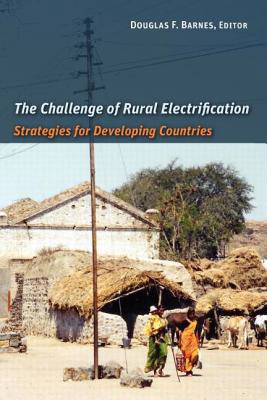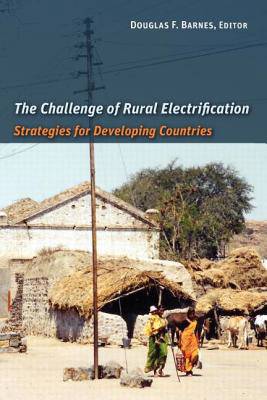
Bedankt voor het vertrouwen het afgelopen jaar! Om jou te bedanken bieden we GRATIS verzending (in België) aan op alles gedurende de hele maand januari.
- Afhalen na 1 uur in een winkel met voorraad
- In januari gratis thuislevering in België
- Ruim aanbod met 7 miljoen producten
Bedankt voor het vertrouwen het afgelopen jaar! Om jou te bedanken bieden we GRATIS verzending (in België) aan op alles gedurende de hele maand januari.
- Afhalen na 1 uur in een winkel met voorraad
- In januari gratis thuislevering in België
- Ruim aanbod met 7 miljoen producten
Zoeken
The Challenge of Rural Electrification
Strategies for Developing Countries
Douglas F Barnes
Paperback | Engels
€ 102,45
+ 204 punten
Uitvoering
Omschrijving
Douglas Barnes and his team of development experts provide an essential guide that can help improve the quality of life to the estimated 1.6 billion rural people in the world who are without electricity. The difficulties in bringing electricity to rural areas are formidable: Low population densities result in high capital and operating costs. Consumers are often poor, and their electricity consumption is low. Politicians interfere with the planning and operations of programs, insisting on favored constituents. Yet, as Barnes and his contributors demonstrate, many countries have overcome these obstacles. The Challenge of Rural Electrification provides lessons from successful programs in Bangladesh, Chile, China, Costa Rica, Mexico, the Philippines, Thailand, and Tunisia, as well as Ireland and the United States. These insights are presented in a format that should be accessible to a broad range of policymakers, development professionals, and community advocates. Barnes and his contributors do not provide a single formula for bringing electricity to rural areas. They do not recommend a specific set of institutional arrangements for the participation of public sector companies, cooperatives, and private firms. They argue instead that successful programs follow a flexible, but still well-defined set of principles: a financially viable plan that clearly accounts for any subsidies; a cooperative relationship between electricity providers and local communities; and an operational separation from day-to-day government and politics.
Specificaties
Betrokkenen
- Auteur(s):
- Uitgeverij:
Inhoud
- Aantal bladzijden:
- 366
- Taal:
- Engels
Eigenschappen
- Productcode (EAN):
- 9781933115436
- Verschijningsdatum:
- 1/08/2007
- Uitvoering:
- Paperback
- Formaat:
- Trade paperback (VS)
- Afmetingen:
- 161 mm x 234 mm
- Gewicht:
- 512 g

Alleen bij Standaard Boekhandel
+ 204 punten op je klantenkaart van Standaard Boekhandel
Beoordelingen
We publiceren alleen reviews die voldoen aan de voorwaarden voor reviews. Bekijk onze voorwaarden voor reviews.









